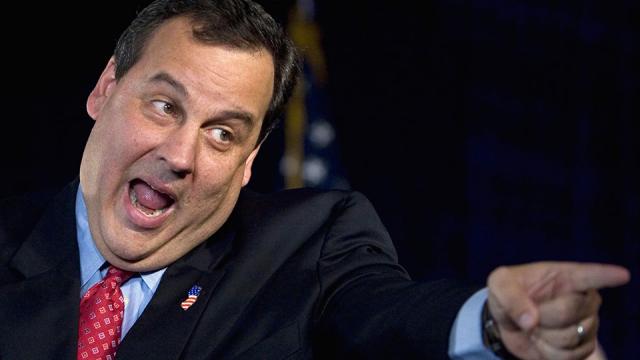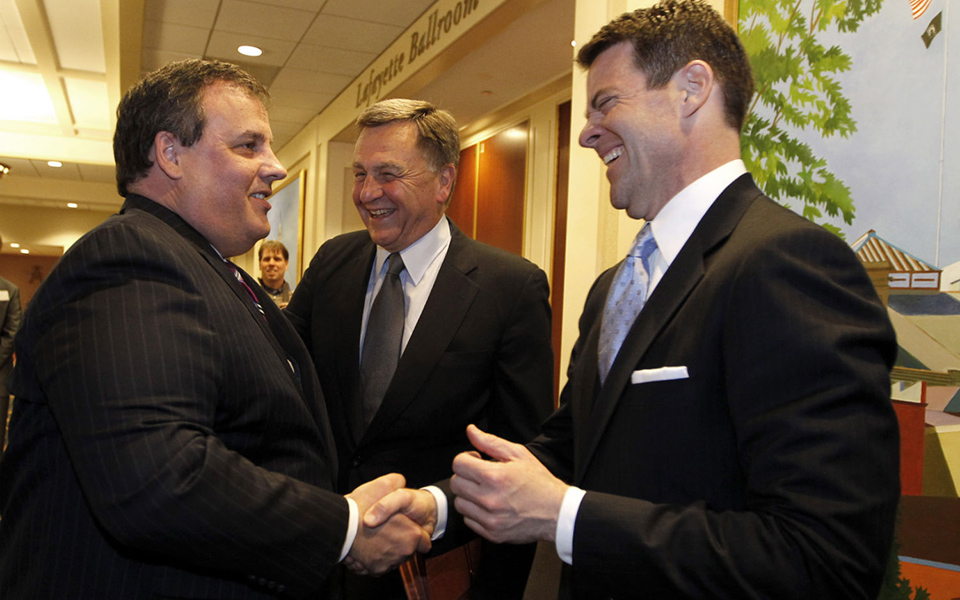
Corporations that contributed millions of dollars to the Chris Christie-led Republican Governors Association (RGA) and other GOP campaigns have received public funding deals worth almost $1.25 billion from his New Jersey administration in less than two years.
A review of the 30 biggest corporate subsidies awarded by the state of New Jersey since Christie appointed one of his closest allies as head of the state’s “bank for business” found that 21 went to ventures involving firms that made significant donations to Republicans, or had senior executives who did.
About half made contributions, totaling $1.8 million, to the RGA, the organization that works to elect GOP candidates to statehouses around the U.S., since Christie became one of its senior officials. The New Jersey governor now chairs the RGA.
Others contributed millions more to Republican committees and candidates including Christie himself; 2012 presidential candidate Mitt Romney, for whom Christie was a campaign surrogate and senior fundraiser; and state senator Joseph Kyrillos, Christie’s former campaign manager.
Only one of the remaining nine subsidy recipients appeared to be strongly Democratic.
The Guardian’s findings prompted calls from Democratic state legislators and watchdog groups for reforms to the New Jersey Economic Development Authority (EDA), which awards the subsidies and is led by Michele Brown, a close friend and veteran aide to Christie. Some favor barring firms that make political contributions from receiving state funding.
“It seems pretty obvious to me that we don’t have enough safeguards in place to make sure these awards are not going out based upon favoritism,” said Senator Loretta Weinberg, the co-chair of the New Jersey legislature’s select committee on investigation.
Assemblyman John Wisniewski, her co-chair, said that Christie should be stripped of his power to appoint the EDA’s chief executive. “It seems to be part a pattern within this administration: the gross politicization of what up until now had really been straight economic development,” said Wisniewski.
Christie, once the early frontrunner for the 2016 Republican presidential nomination, is under investigation by the legislature’s select committee and federal prosecutors over the politically motivated closure of lanes to the George Washington bridge last September. New Jersey is also facing a $2.7 billion budget shortfall over the next year.
The Guardian examined the 30 biggest subsidies, awarded by Christie’s EDA in the form of 10-year tax breaks, since Brown took over as chief executive on 1 October 2012. Many of the awards were given to corporate partnerships with names that did not make their ownership arrangements immediately clear.
Among the 30 were a $106 million subsidy for the property venture of another close Christie friend and campaign donor, Jon Hanson, and a $223 million award to a retail development by Prudential, a major contributor to the RGA and the biggest corporate funder of Christie’s official mansion. Both of these deals were disclosed by the Guardian earlier this month.
Brown, previously Christie’s appointments counsel and senior aide when he was the state’s US attorney, replaced Caren Franzini, an 18-year veteran of the EDA, who had served Republican and Democratic governors. The EDA is responsible for awarding subsidies to spur investment in New Jersey and boost the state’s flagging economy.
In her fourth week in the job, 12 days before the 2012 election, Brown unveiled a contest for property developers with a $100 million prize fund. She said it would reward residential ventures “stimulating economic activity and improving the quality of life” in New Jersey’s biggest cities.
One of the three winners to eventually split the money was a development by Kushner Real Estate, whose chairman has given $133,000 to Christie and the New Jersey Republican Party since 2009. The second winner was a venture by a Connecticut-based Building And Land Technology, whose CEO and president gave $210,000 to Romney and the RNC in 2012. The third was a mainly non-profit venture whose “private partner,” Citibank, has contributed $359,950 to the RGA since 2011. None responded to requests for comment.
A track record of contributions to the RGA, a Washington-based political non-profit to which people may make unlimited donations, was a common characteristic among recipients of some of the other biggest corporate subsidies awarded by the EDA under Brown’s leadership.
Between December 2012 and August last year, almost $180 million was awarded to five corporations – Caesar’s Entertainment casinos group; Siemens, the electronics giant; Honeywell, the aerospace and engineering firm; NRG, the power company; and Medco, the mail-order pharmacists – that separately contributed more than $1.1 million to the RGA since 2011, when Christie became its vice-chairman. All those who responded to requests for comment said that there were no connections between the political contributions and the corporate subsidies.
Three further tax breaks, totaling more than half a billion dollars, have been awarded so far this year to major RGA contributors: Prudential and JPMorgan Chase, the bank, which between them have contributed more than $200,000; and the Philadelphia 76ers NBA team, whose owner Josh Harris gave $50,000. A Prudential spokesman said the firm had “never sought to influence a decision on tax credits by making political contributions.” JP Morgan and the 76ers did not respond to requests for comment.
The findings raised fresh questions about Brown’s leadership of the EDA, which is currently under audit by federal authorities over its use of $23 million in disaster recovery funds that were spent on a television ad campaign starring Christie following hurricane Sandy.
It emerged during Christie’s 2009 campaign that he loaned Brown $46,000 without reporting this on his tax return or financial disclosure forms. Christie insisted that he was only helping out a friend. Brown resigned, saying that she did not want to be a distraction.
State senator Raymond Lesniak, Democrat for Union County, criticised Brown at the time of her selection as “an obvious political appointee with no experience in economic development”. He told the Guardian: “In retrospect, I wish I had put – and should have put – limits on campaign contributions from businesses and people employed by these businesses who get these tax incentives”. Lesniak said that legislation was now needed to address this.
Lesniak said he supported a proposal also made by Good Jobs First, a watchdog group that monitors corporate subsidies by state authorities, that the awards be subject to the same state law against “pay-to-play” that bars New Jersey authorities from contracting goods and services from companies that make significant political contributions, or have major shareholders who do.
“When political donors turn economic development programs into captive corporate piggy banks, this is the definition of corrupt crony capitalism,” said Greg LaRoy, the group’s executive director. “This is where the Tea Party right and the progressive left, and a growing number of small-business owners, agree.”
Weinberg, the co-chair of the legislature’s investigation committee, said that in light of the Guardian’s findings, she would be asking the Office of Legislative Services, a nonpartisan department that provides legal counsel to the state legislature, whether the subsidy programs should in fact already be covered by the existing laws against “pay-to-play”.
Several more of the 21 biggest subsidy awards were made to companies that made substantial contributions to Romney’s 2012 campaign, or had senior executives who did. Among the nine others, some made unremarkable donations or broadly comparable contributions to both Republicans and Democrats. Some made no significant campaign contributions.
Another of the nine – the American Dream retail and entertainment mall, which received a $390 million award, the biggest made by Christie’s administration – is a client of Wolff & Samson, the law firm of David Samson, the embattled Christie ally who chaired the Port Authority of New York and New Jersey until resigning in March amid the George Washington Bridge scandal. Prosecutors are also reportedly separately investigating the Port Authority’s awarding under Samson of $2.8 billion in contracts to construction firms with ties to Wolff & Samson. A spokesman for the mall said that Wolff & Samson played no role in securing the funding.
Christie’s office has said repeatedly that it has no involvement in the awarding of corporate subsidies. It stresses that all successful projects must be judged by EDA officials to benefit the state overall with new tax revenues in the long term. All projects must also be approved by a majority vote of the EDA board. A majority of board members are Christie appointees.
Kevin Roberts, a spokesman for Christie, did not return a request for comment. He said in an earlier statement on the same subject: "Any program funding is awarded based on a strict, objective review process dictated by statute and program rules," adding: "the Governor’s Office has no role in that process whatsoever."
Erin Gold, a spokeswoman for the EDA, did not respond to a request for comment. She said in an earlier statement that the authority “administers these bipartisan, legislatively-created incentive programs with the highest level of due diligence and in strict compliance with the statutes.”
“This includes conducting a comprehensive net benefit analysis to ensure that projects will result in a net positive impact to New Jersey, and requiring that projects first generate new tax revenue, complete capital investments, and/or hire or retain employees to receive the approved benefits,” said Gold.
3 WAYS TO SHOW YOUR SUPPORT
- Log in to post comments












